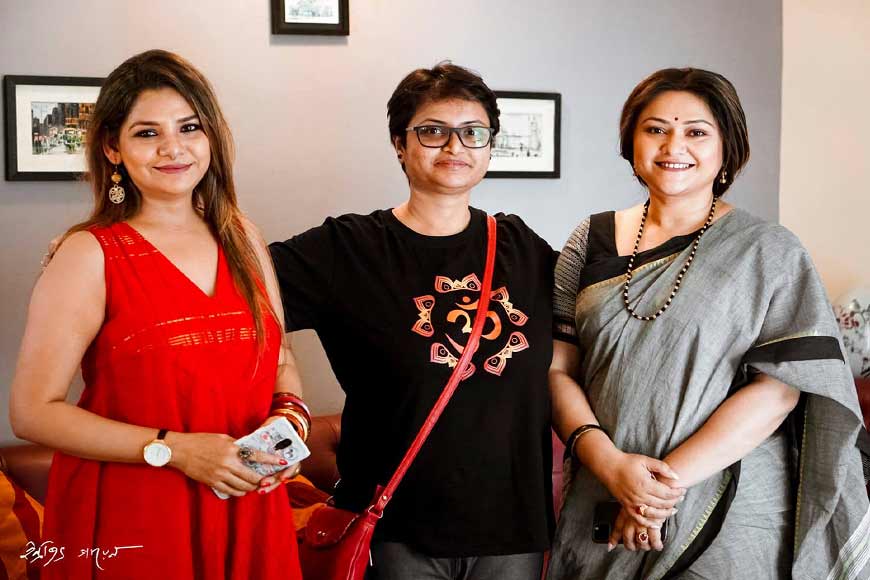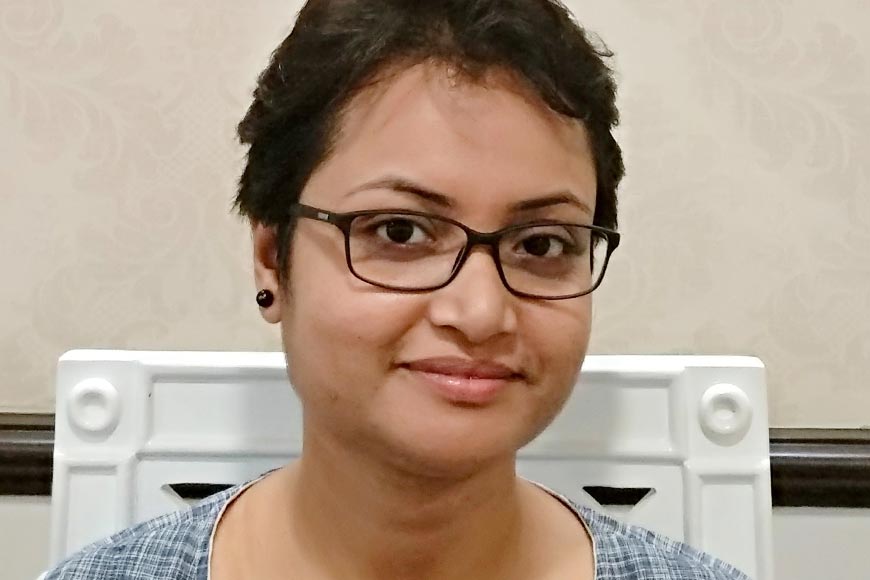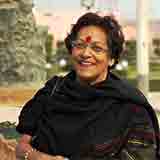Who is a prostitute, asks Pramita Bhowmik’s short film

The history of Indian cinema has created many films dealing with the sex worker who lives on the fringes of mainstream society and belongs to a marginalised ghetto. Among the memorable examples are Shyam Benegal’s Mandi (1983), Gulzar’s Mausam (1975), T.S. Ranga’s Giddh (1984), B.R. Ishara’s Chetna (1970) and Basu Bhattacharya’s Aastha (1996).
But there have not been many films that explore a confrontation between the sex worker and the housewife. Pramita Bhowmik, already a noted poet in Bengali and a PhD in the Arts, has a published collection of poems called Shunyer Kachhe Swikarokti (Confessions to Infinite Space). She is now involved in making films and has already made two short films.
Her latest film is in Bengali, called Porichoy (The Identity) where she brings in comparisons through a confrontation between two old friends who meet after 15 long years. One of them is a housewife or homemaker, while the other openly says that she is a sex worker. The 12-minute film won an outstanding achievement award at the Berlin Flash Film Festival in April this year.
The two friends are portrayed by Sudipta Chakraborty as the sex worker Shreya, and Konineeca Bandopadhyay as the housewife Anuradha. Bhowmik makes no attempt to veil the harshness of the subject with surface romanticism or cinematographic glamour. The performances by the two protagonists are brilliant and actually enrich the narration. There is no melodrama in the entire film.
 Director Promita Bhowmik
Director Promita Bhowmik
Shreya points out to Anuradha that not only does the latter not have an identity of her own, but she also has no choice in life. She is reduced to an automaton trapped within the four walls of her flat, tending to her husband and child while she, Shreya, is entirely her own person, who can pick and choose or reject a client she does not fancy, so she has an identity she is proud of. If others do not like it, it is their problem, she says.
Who is a prostitute? In the Indian law statutes, prostitution is defined as the act of a female who offers her body for promiscuous sexual intercourse for hire, in exchange for money or kind. To be called a prostitute under the Suppression of Immoral Traffic in Women and Girls Act 1956 (drastically amended in 1987 by the Amendment Act 1986 so that the name of the Act is ‘Immoral Traffic (Prevention Act), two things have to be satisfied which are: (a) a female has to offer her body for indiscriminate sexual intercourse, and (b) she should do so for some financial consideration.
This is the legal definition. But the term can be applied to any woman who does not subscribe to conservative norms laid down by society exclusively for women. ‘Prostitute’, therefore, becomes a loosely defined term thrown casually at any woman by any man or woman as a form of abuse, insult and an extreme form of humiliation.
Mainstream society has no criteria to decide which woman is a prostitute and which woman is not. It therefore decides solely based on self-imposed norms of a woman’s body language, her style of dress, the company she keeps, and even by her mannerisms, such as laughing loudly in public, using colourful vocabulary, and so on.
Society also decides that a woman is a prostitute by the hour of the day or night she is out. In other words, mainstream society can choose any criteria it wishes in order to label a woman a ‘prostitute’, and make her a social outcast, stigmatising her with imaginary labels. This is actually an effective way of humiliating women to force them to adhere to conservative norms, which are absolutely patriarchal, and to restrict their geographic, economic, personal, and even emotional liberty.
By tradition and by law, the housewife or, in its new nomenclature ‘homemaker’, is not taken to be an economically productive person. The reward that she gets in exchange for the real and concrete services she renders is solely emotional, in terms of the satisfaction her services bring to other members of the family. In other words, though her services are direct, the rewards are vicarious. Lenin defined housework as, “The most unproductive, the most barbarous and the most arduous work a woman can do. It is exceptionally petty and does not include anything that would in any way promote the development of the woman.” This ideology sustains today as census indicators have proved.
.jpg) Behind the scenes (Porichoy)
Behind the scenes (Porichoy)
The widespread control - broadly described as ‘patriarchal’ - of women’s sexuality in the service of reproduction within the structure of marriage and family, renders other expressions of it as outlawed. When women place monetary value upon and claim payment for the work that they traditionally perform for ‘free’ - out of love, instinct, for intangible (non-monetary) ‘rewards’ - even outside the household, it is viewed as betrayal. At the same time, when professions are ‘feminised’ in the wage market, like prostitution which is so obviously an almost totally ‘feminised’ occupation, they are devalued. Commercial sex is, therefore, an inferior version of ‘real’ (or free, romantic) sex, which reflects adversely upon both prostitute and client.
Therefore, in effect, there is very little difference between Shreya, the sex worker and her friend Anuradha, the US-returned housewife. Neither of them has an identity, or can choose the terms of their livelihood the way they wish to. Nor can Shreya really claim that she lives life on her own terms and likes the way she lives.
Also read : Rammohan remembered: Sati and Antarjali Jatra
Can being a sex worker and living on the fringes of the mainstream really be an identity? Or is Shreya deliberately leaving behind very problematic questions for her friend because as a sex worker, she has no one to take care of or be responsible for? She takes care of her ailing mother, but is that the same thing? Is her pride a mask she puts on to perhaps console herself? Or has she compromised with a ‘choice’ forced on her by circumstances she refuses to reveal? “I have gone through a lot of struggle to reach here,” she says. Reach where? Where will she go from here, since sex work has a very limited lifespan?
Sex work sets off a chain of infrastructural support, such as agents or middlemen, who set up clients and appointments, spaces where the sex worker can meet her client. Often, there is a ‘madam’ who calls the shots. Even within the elite classes which Shreya seems to serve, there is an invisible chain of middlemen. The film assumes that these do not exist for ‘independent’ sex workers like Shreya. There are such women but their numbers are few and far between. And they do not expose themselves readily as Shreya does.
 A still from Saheb Bibi Golam
A still from Saheb Bibi Golam
Though the distinctions between women who are prostitutes and women who are not are sharply and explicitly drawn in social negotiations and interactions, the slippages between the two categories are frequent and significant in theory, argument, and practice. The contractual terms of bourgeois marriage; many women’s confessions to ‘occasional prostitution’, or sex for favours, the forms of heterosexual ‘dating’; the description of women accused of promiscuity as ‘whores’ - these provide examples of the blurring of categories of respectable bourgeois womanhood and the prostitute, otherwise maintained in sharp distinction from each other.
Pratim Gupta’s Bengali film Shaheb, Bibi, Golam (2016) presents this by pulling out all the stops. In the film, housewife Jaya/Shuktara (Swastika Mukherjee), deprived of sex by her gay husband, unwittingly steps into prostitution through an acquaintance and begins to enjoy the freedom, the sex and the money. What slot will you box her in – a housewife, or a prostitute? She is caught finally and thrown out of her marital home. But she does not beg to be taken back. The film was screened at the New York Indian Film Festival and the International Film Festival of South Asia, Toronto.
Porichoy, as a film, is very good and a powerful statement on ‘identity’ from the director’s perspective, who is also a woman. But it leaves many questions unanswered and also raises questions around the very fragile notion of identity.
1Flavia Agnes : State, Gender and the Rhetoric of Law Reform, Research Centre for Women's Studies, S.N.D.T. Women's University, Bombay, 1995, pp.128-129.
2 Rajeswari Sunder Rajan, “The Prostitution Question(s) : (Female) Agency, Sexuality and Work”in Ratna Kapur (ed.) Feminist Terrains in Legal Domains : Interdisciplinary Essays on Women and Law in India, Kali for Women, Delhi, 1996, p.123.











